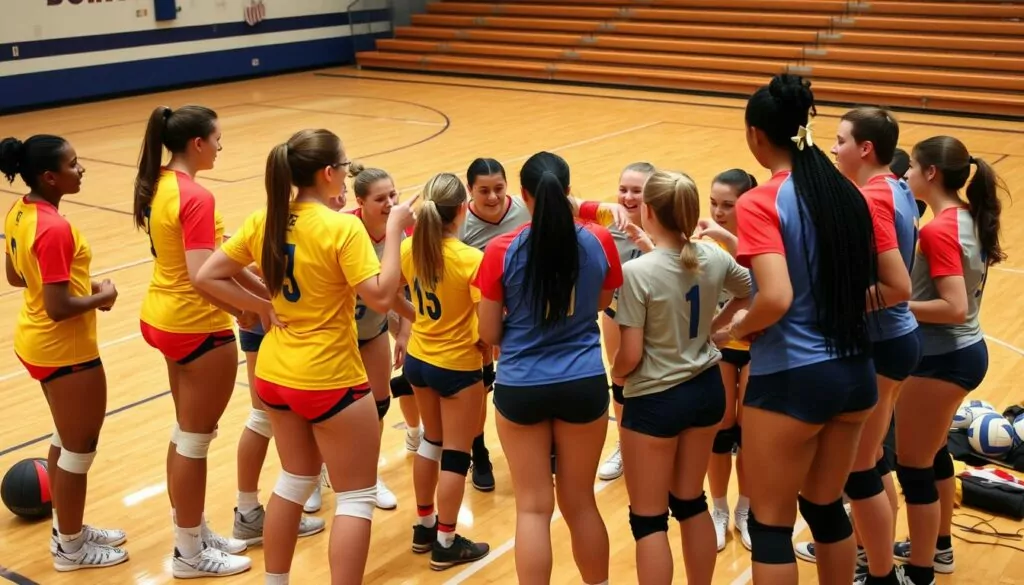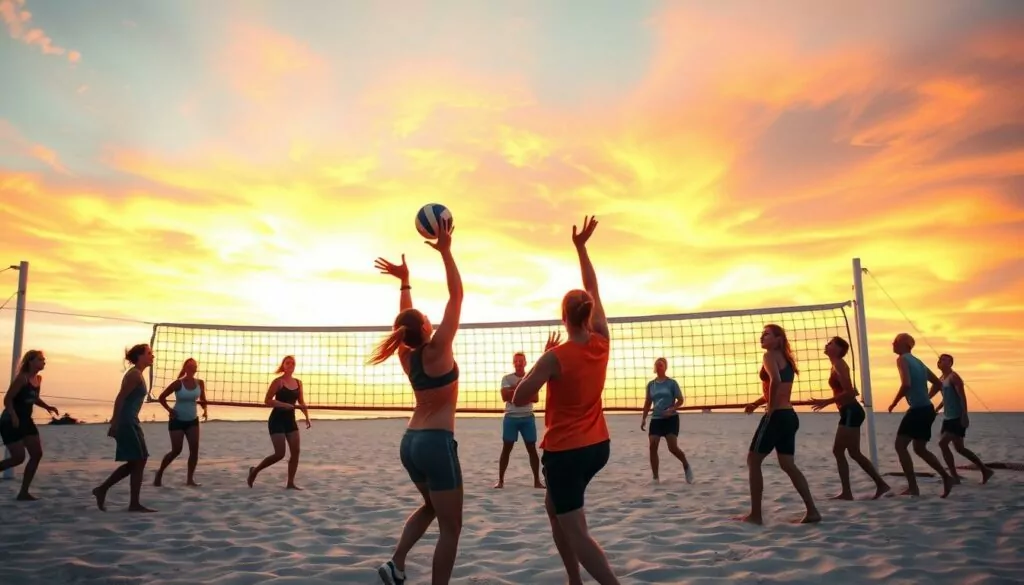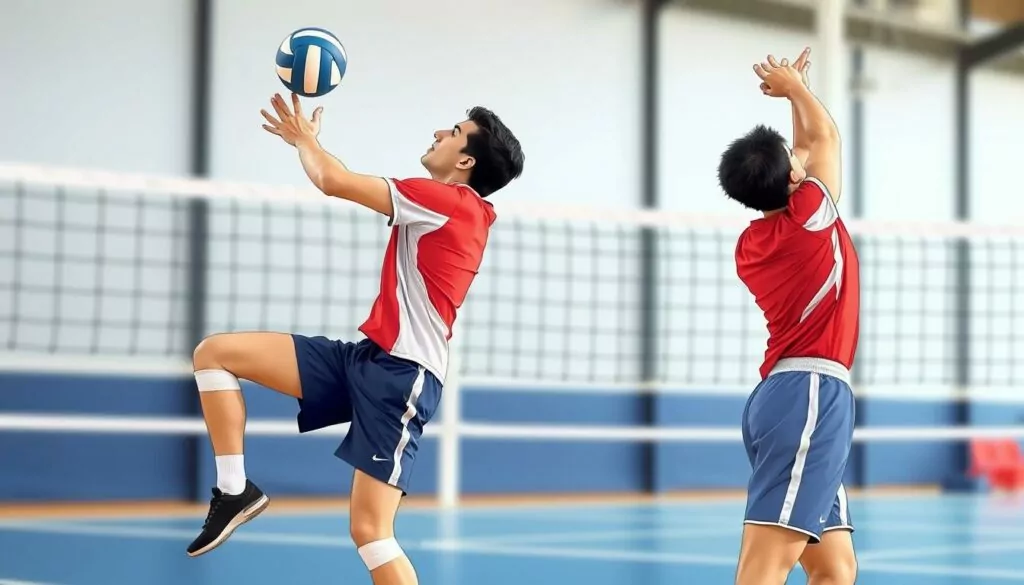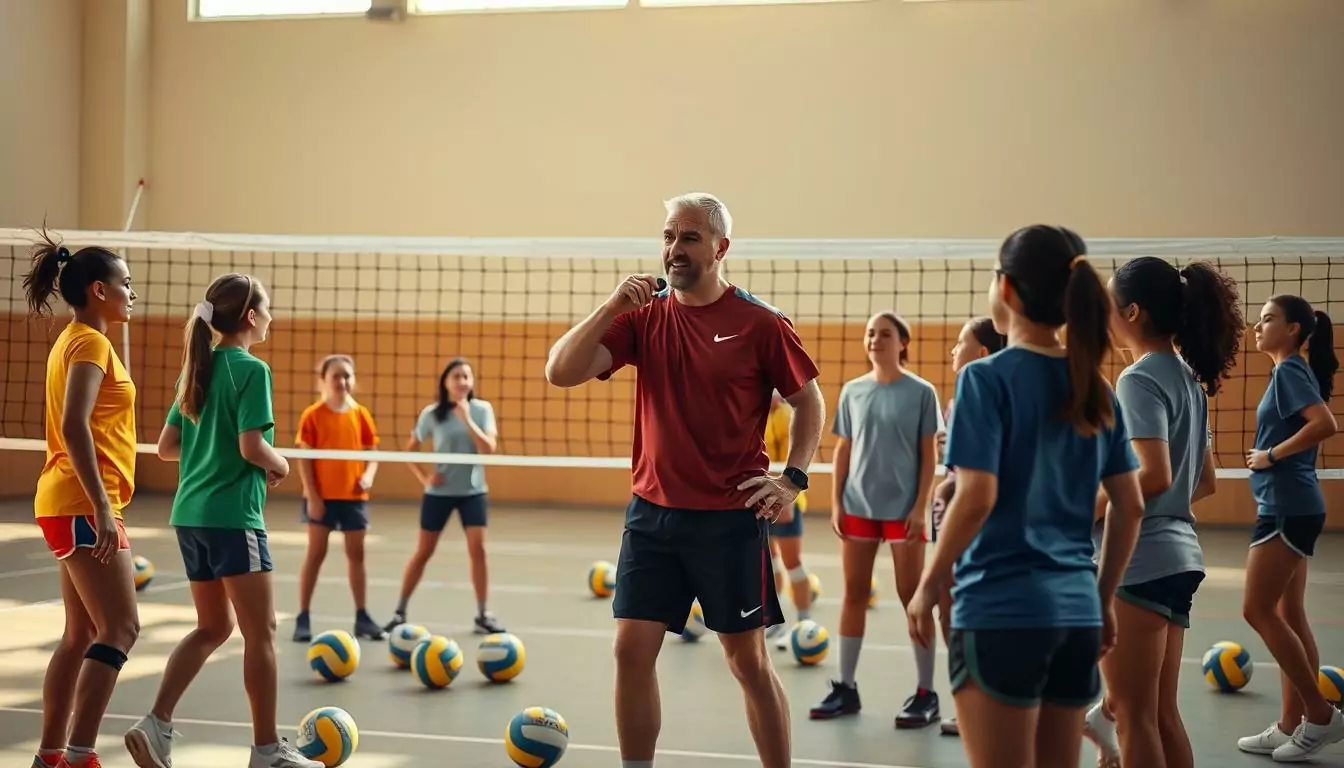Coaching volleyball goes beyond teaching technical skills. It’s about building a positive team culture and inspiring players. As a coach, I’ve worked with teams at various skill levels, from recreational leagues to elite clubs.
One memorable experience was coaching a struggling high school team. The players lacked confidence when I started. We focused on skill training, strategic gameplay, and team bonding. This approach transformed the team’s mindset.
Our hard work paid off when we secured a spot in the state championships. The journey had challenges, but the pride we felt was incredible.
In this guide, I’ll share essential volleyball coaching tips. These strategies have helped my teams succeed both on and off the court. They’ll help you build a strong, successful volleyball program too.
Key Takeaways
- Establish a strong team culture and instill core values
- Develop effective practice plans to improve technical skills
- Set clear goals and expectations for players and the team
- Emphasize the importance of mental preparation and communication
- Analyze game performance and make adjustments to strategy
Fundamental Volleyball Coaching Tips for Building a Strong Team

Volleyball coaches aim to create high-performing teams. This involves building team culture, planning practices, and setting clear goals. Mastering these skills can help unlock your team’s potential.
Establishing Team Culture and Values
A positive team culture is vital for a strong squad. Define core values like sportsmanship, teamwork, and commitment. Encourage players to embrace these values as part of the team’s identity.
Use team-building activities to strengthen connections and promote camaraderie. This improves team communication and creates a supportive environment. Players will feel empowered to take risks and push their limits.
Creating Effective Practice Plans
Well-structured practice plans are key to team development. Mix skill-building drills, tactical exercises, and motivational coaching. This keeps players challenged and engaged.
- Prioritize specific areas for improvement based on your team’s needs and strengths.
- Incorporate progressive skill-building activities to help players continuously refine their techniques.
- Regularly mix up the practice routine to maintain high levels of focus and energy.
Setting Clear Goals and Expectations
Clear goals and expectations align players’ efforts. Work with your team to set specific, measurable, and achievable objectives. Include both short-term and long-term goals.
Review goals regularly and provide feedback on progress. This keeps your team motivated and focused. It also allows you to adjust coaching strategies as needed.
“The strength of the team is each individual member. The strength of each member is the team.” – Phil Jackson
These tips can help build a strong, cohesive volleyball team. Your team will be ready for success on and off the court.
Mastering Technical Skills and Training Methods

Developing players’ technical skills is crucial for volleyball success. This section explores key techniques and effective training methods for team excellence.
Serving is a fundamental skill that can give your team an edge. Include various serving drills in your training sessions. Encourage players to try different techniques to find their strengths.
Passing is another critical skill to focus on. Create drills that improve platform technique, hand positioning, and footwork. Stress the importance of a stable base and reading ball trajectory.
Include diverse passing scenarios to help players adapt to game situations. This can include off-speed or tipped balls.
- Incorporate setting drills that challenge players’ accuracy, consistency, and decision-making. Encourage setters to work on their footwork, body positioning, and ball control to ensure smooth and efficient transitions from pass to set.
- Devote time to honing your players’ hitting skills. Drill them on various attack approaches, swing mechanics, and shot selection. Encourage them to experiment with different hitting angles and tempos to keep the opposing defense guessing.
- Mastering the art of blocking is crucial for a well-rounded volleyball team. Practice blocking drills that focus on timing, hand positioning, and court awareness. Teach your players to read the opposing hitters and make split-second decisions to effectively defend the net.
Conditioning exercises are vital for a complete training program. Include plyometrics, agility drills, and strength training to boost players’ athleticism.
These elements will help create a team that can execute skills with precision. Your players will be able to perform efficiently on the court.
| Technical Skill | Recommended Drills | Conditioning Exercises |
|---|---|---|
| Serving | Target serving, jump serving, float serving | Plyometric jumps, agility ladder drills |
| Passing | Platform passing, off-speed passing, tipped ball passing | Lateral movement drills, core strengthening |
| Setting | Accuracy drills, decision-making scenarios, backset drills | Footwork exercises, upper body strength training |
| Hitting | Approach and swing technique, shot selection, line/cross-court hitting | Vertical jump training, explosive power exercises |
| Blocking | Timing drills, hand positioning, court awareness | Reaction time drills, jumping and landing mechanics |
Focus on both skill development and conditioning exercises to boost your team’s performance. Consistent practice and balanced training are key to mastering volleyball skills.
“Mastering the fundamentals is the key to success in any sport, and volleyball is no exception. Invest the time and effort in developing your players’ technical skills, and you’ll see the payoff on the court.”
Advanced Offensive and Defensive Strategies

Mastering advanced volleyball strategies is key to elevating your team’s performance. Focus on serve techniques, defensive drills, and offensive strategies. These skills will help your players outmaneuver opponents and excel on the court.
Developing Effective Serve Techniques
The serve is often the first attack in volleyball. Honing your team’s serving abilities can be a game-changer. Explore various serve techniques like float, jump, and spin serves.
Work with players to perfect their form and accuracy. Encourage them to try different grips and approach angles. This helps them find serves that best suit their strengths.
Implementing Defensive Formations
A solid defense is crucial for countering your opponent’s offensive strategies. Try different defensive drills and formations, such as 5-1 and 6-2 systems. These help create a flexible defensive unit.
Teach players to communicate effectively and read opposing team’s patterns. This helps them anticipate attacks and respond quickly.
Creating Dynamic Attack Patterns
Boost your team’s offensive strategies with dynamic attack patterns. This keeps the opposing defense guessing. Use quick sets, cross-court attacks, and combination plays to create scoring chances.
Encourage hitters to mix up their shot selection. Work with setters to create a powerful, unpredictable offensive system.
| Serve Technique | Description | Advantages |
|---|---|---|
| Float Serve | A serve that has minimal spin and travels in an unpredictable path | Disrupts the opposing team’s passing and makes it difficult to predict the ball’s trajectory |
| Jump Serve | A serve where the player jumps and strikes the ball at the peak of their jump | Generates more power and can be challenging for the opposing team to receive |
| Spin Serve | A serve with a high amount of spin, causing the ball to curve in the air | Adds an element of unpredictability and can be difficult for the opposing team to pass accurately |
Mastering these advanced strategies will prepare your team for success. They’ll be ready to outmaneuver opponents and dominate on the volleyball court.
Mental Preparation and Team Communication
Mental preparation and team communication greatly impact a volleyball team’s success. These elements transform talented individuals into a high-performing squad. They often make the difference between winning and losing.
I use various techniques to build mental toughness in players. Visualization exercises boost confidence and focus. Goal-setting sessions empower athletes to own their progress. Breathing exercises help manage stress and anxiety on the court.
Strong team communication is key to my coaching philosophy. I encourage players to actively listen to one another. They learn to share feedback constructively and celebrate each other’s achievements.
This approach creates an environment of trust and support. Teams develop a camaraderie that directly improves their performance. Players become more in sync with each other.
“Mental preparation and team communication are the cornerstones of a successful volleyball program. When players are mentally tough and in sync with one another, they can overcome any obstacle on the court.”
My focus on mental preparation and team communication helps players reach their full potential. It benefits them as individuals and as a team. This investment has a transformative impact on a team’s path to victory.
Game Analysis and Performance Evaluation
Analyzing game performance is vital for volleyball coaches. It helps drive player development and improve team strategy. By reviewing footage and tracking metrics, coaches can gain valuable insights.
Game analysis begins with capturing and reviewing match videos. This allows coaches to examine player techniques and decision-making closely. They can then design targeted practice drills to address improvement areas.
Keeping detailed player statistics is equally important. Metrics like kill percentage and serving accuracy provide data-driven perspectives. This information helps coaches set concrete goals and make informed decisions about player rotations.
With these insights, coaches can have meaningful conversations with players. They can set development goals and optimize strategies. This approach fosters continuous learning and growth within the team.
| Metric | Description | Importance |
|---|---|---|
| Kill Percentage | The ratio of successful kills to total attacks | Indicates an attacker’s efficiency and ability to terminate points |
| Serving Accuracy | The percentage of serves that land in-bounds | Reflects a player’s serving technique and their contribution to the team’s game analysis |
| Defensive Efficiency | The ratio of successful digs to total ball contacts | Measures a player’s defensive skills and their impact on the team’s ball control |
Regular review of game footage and performance data is crucial. It allows coaches to provide constructive feedback to players. This holistic approach to game analysis and skill development enhances overall team performance.
Adapting Coaching Styles for Different Skill Levels
Volleyball coaching requires a flexible approach. Each player and team has unique needs. Coaches must adapt their styles to bring out the best in everyone.
For beginners, focus on fundamental skills like passing, setting, and serving. Break down techniques into simple steps. Provide plenty of hands-on practice to build confidence and a strong skill base.
Advanced players need more complex drills and tactics. Encourage critical thinking and problem-solving on the court. Emphasize team dynamics and help players understand their roles within the group.
Positive reinforcement is crucial for all skill levels. Celebrate victories, big and small. Provide constructive feedback that focuses on improvement rather than criticism.
Adaptability is key in volleyball coaching tips and motivational coaching. Tailor your approach to each player’s needs. This helps them reach their full potential and develop a lasting love for the sport.
“The best coaches are those who are able to adapt their style to the individual needs of their players.”
| Coaching for Beginners | Coaching for Advanced Players |
|---|---|
|
|
Conclusion: Bringing It All Together for Volleyball Success
Volleyball success requires a multifaceted approach. It integrates technical skills, strategy, mental prep, and team communication. Blending these elements is crucial for unlocking your team’s potential.
Building a strong team culture sets the stage for high performance. Create purposeful practice plans and clear goals. Master technical skills and advanced strategies for precise execution.
The mental game is equally important. Foster open communication among players. Help your team develop resilience to overcome challenges.
Analyze your team’s performance regularly. Adapt your coaching style to different skill levels. This ensures continuous growth and evolution of your program.
Coaching volleyball is an ongoing journey of learning and inspiration. Stay dedicated and open-minded. Embrace the challenge of guiding your players to new heights.
